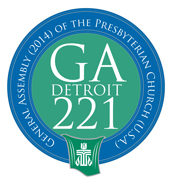 As I write I'm in Detroit for the 221st General Assembly ("GA") of the Presbyterian Church (USA). This is a biannual gathering of elected pastors and elders, plus many others, when the denomination tends to issues with national and international implications. I've been to a handful of assemblies in recent years, even though I haven't had any official role since I was elected a "seminary-student advisory delegate" in 1983. Going now and then has been a good way to stay in touch, get a pulse of the national conversation, be inspired, become frustrated, get bored, be fascinated, be humbled, and more. I also get fodder now and then for sermons (or blog posts).
As I write I'm in Detroit for the 221st General Assembly ("GA") of the Presbyterian Church (USA). This is a biannual gathering of elected pastors and elders, plus many others, when the denomination tends to issues with national and international implications. I've been to a handful of assemblies in recent years, even though I haven't had any official role since I was elected a "seminary-student advisory delegate" in 1983. Going now and then has been a good way to stay in touch, get a pulse of the national conversation, be inspired, become frustrated, get bored, be fascinated, be humbled, and more. I also get fodder now and then for sermons (or blog posts).
In the midst of all of our wrestling and arguing, in between all our position taking, alongside the occasional outburst of anxiety or anger, every now and then the Holy Spirit seems to blow through for a moment. Maybe she comes in a sermon, a song, an encounter, or an innocent word from someone unschooled in the politics of it all.
 I tend to move back and forth between committees dealing with the hot button issues—usually the ones that the media are covering and that members of the church might ask about when I get home. I want to be able to interpret those proceedings, not leaving my congregation to only press reports, commentaries from advocacy groups, or rumors heard in the street.
I tend to move back and forth between committees dealing with the hot button issues—usually the ones that the media are covering and that members of the church might ask about when I get home. I want to be able to interpret those proceedings, not leaving my congregation to only press reports, commentaries from advocacy groups, or rumors heard in the street.
When sitting in on a committee hearing for one of the hottest of the hot button issues this year, as folks gave articulate and passionate arguments on both sides of the issue (there are usually more than two sides of an issue, but on this day there seemed two), I heard various members of the committee speak. The rest of us were just watching. There was a period of open conversation at one point that allowed conversation to get a bit more personal, and folks gave some impassioned pleas for support for their beliefs. Alongside some talk of substance of the issue, a lot of the talk was about perception. It was about how folks outside the denomination would perceive decisions made. It was about the media, about other advocacy groups, about impact on our evangelism. It was about making decisions on that basis. The concern has some merit.
At one point a young man raised his hand. The chair eventually called on him. He gave his name and said he was an appointed committee member (called a commissioner) from a presbytery in northern Michigan. He then gave his comment. He began:
Over these past two days I feel like I've been on a swing. I didn't come with my mind made up. I've heard passionate and strong feelings on both sides. I've changed my own mind several times. And today, at least right now, I still don't know how I feel or how I will vote. But I do know that I won't make my decision out of fear. I won't let fear of the media or fear of how other groups will respond to what they think I've done sway me. I don't think we should decide from that kind of fear. I think we should decide from faith. Jesus tells us to not fear. I want to follow him and trust him. I don't know how I'll finally vote, but I do know this. And I know that this is how I want to decide. I want to decide with faith, and not with fear.
As I wrote a minute ago:
In the midst of all of our wrestling and arguing, in between all our position taking, alongside the occasional outburst of anxiety or anger, every now I then the Holy Spirit seems to blow through for a moment. Maybe she comes in a sermon, a song, an encounter, or an innocent word from someone unschooled in the politics of it all.
That's what I heard.








